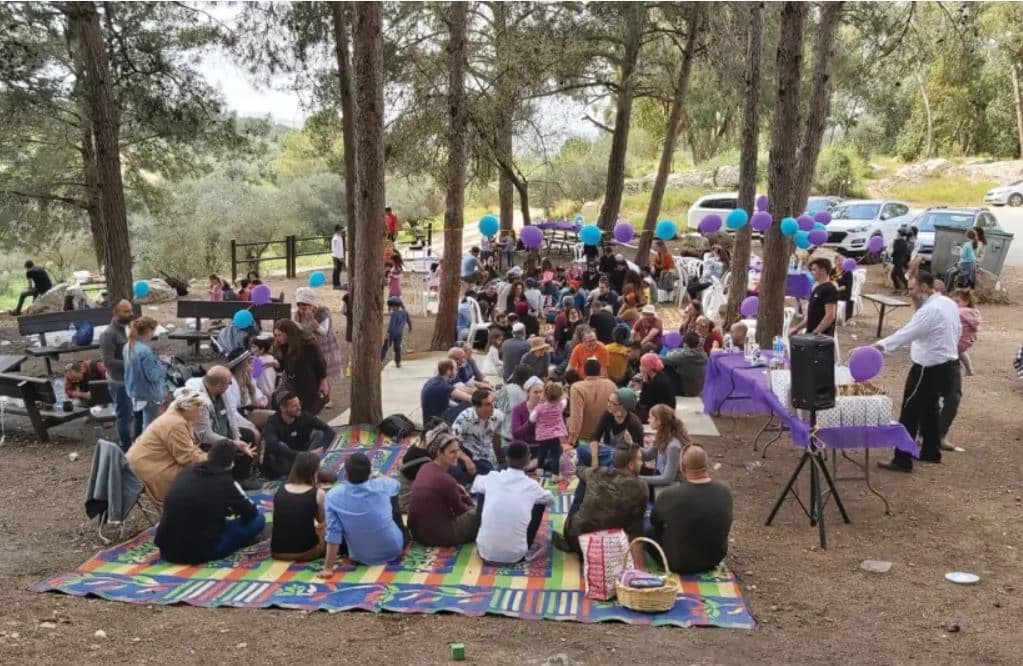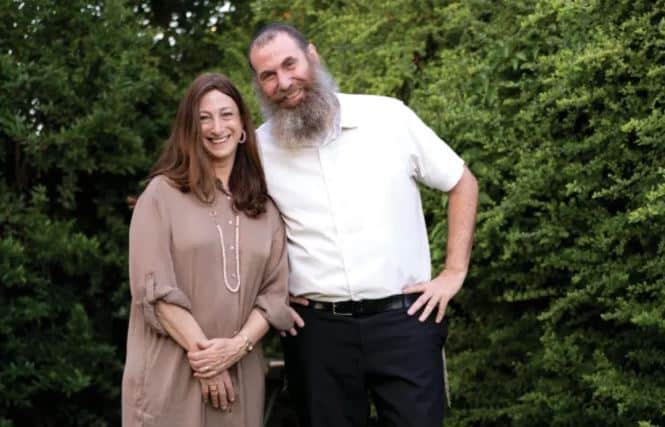Couples who develop in different directions learn to work it out – with a little help from their friends
By \\ BARRY DAVIS The Jerusalem Post
Any marriage guidance counselor will tell you that relationships are a challenge, especially long-term ones. Indeed, that probably goes for the partners in question, too.
We often fall in love at a young age and live life just one day at a time, albeit with the odd rose-tinted spectacle expectation of how things will pan out in the long term.
ייעוץ לזוגות עם פערים דתיים
דתיים וחילונים יכולים לקיים זוגיות מאושרת. שיחת היכרות והתאמה חינם.
But, as anyone with a few years’ experience of wedlock knows only too well, things don’t always run harmoniously all the time, and hard work and give-and-take are often the order of the day. That goes doubly – or trebly or even more – when the couple suddenly find themselves observing each other from opposite sides of a belief-based divide.
That, in a nutshell, is what Hitkashroot is all about. The said nonprofit – Hitkashroot, A Spiritual Jewish Experience, to give its full titular due – helps couples who run into trouble, serious trouble, when one of the partners decides to lead a religious way of life while the other remains firmly entrenched in the secular world.
Since it first opened for sterling business 14 years ago, near Jerusalem, Hitkashroot has set out to help couples struggling to come to terms with the chasm that has suddenly or, possibly, gradually appeared between them.
While it is not always the case, people who discover the benefits of Jewish religious observance, especially those who felt all at sea, emotionally and personally, beforehand, can disappear out of sight. They may have a sense of “finding the light” and become consumed with their newfound path to an understanding of the way things work, leaving their better half marooned and trying to come to terms with the realization that the person they met, fell in love with and married, and with whom they, in many cases, had a family, has changed tack, sharply and irrevocably.
That Hitkashroot is there to help, running workshops, all kinds of activities for individuals, couples and groups, and offering professional advice and a sympathetic ear, must be a boon for all concerned. And it must be of great help, to the couples, to know that the people who conceived the organization, Ami and Avital Baram, know exactly where they are coming from.
“The amuta [nonprofit] came about due to the crisis I and my wife experienced when I became religious and she didn’t,” Baram notes. “Our crisis led us to try to help others, as we learned from own mistakes and the stupid things we got into.”
Nietzsche posited, back in the late 19th century, that what doesn’t kill you makes you stronger. That aphorism has stood the test of time, and has been cited in all kinds of predicaments and walks of life. It certainly rings true for the Barams, too.
And the proof of the pudding has been there for quite some time now.
“I started becoming religious when I was 27. That was 24 years ago,” says Baram. “We have been able to help a great many families over the years.”
The fact, alone, that the Barams are still together is testimony to the robustness of their relationship and the wisdom of their philosophy.
Almost a decade and a half on since it took root, Hitkashroot has seen quite a few couples, often bewildered and desperate, enter its portals and come out the other side in a much healthier, more accepting and more forgiving state.
“I reckon that close to 1,000 couples have passed through our hands since we started out,” Baram states, adding that there are probably plenty more out there who have not taken advantage of the amuta’s services.
“There is always a lot of ebb and flow within the Jewish people,” he chuckles, adding a quite startling piece of information. “I understand that one out of three couples moves, goes through something. Either they become religious, or become secular.”
One third? That is pretty amazing. “According to official statistics 20% of Israelis become less religious, and 13% become more religious.”
The Barams certainly went through an emotional wringer themselves when Ami began becoming observant. They almost didn’t make it through in one piece.
“Relationships is a challenge anyway, and the rate of divorce is very high,” he observes. “Regardless of religious-secular aspects, people just get divorced.”
The Barams very nearly joined that statistical stockpile. “The idea of separating was broached. We didn’t get as far as the rabbinate [rabbinical court], but we had a feeling of hopelessness, and there was a sense of being cheated on.”
The latter sentiment was one of Avital’s emotional reactions. After all, the man she’d met a few years earlier was, to all intents and purposes, turning into a very different kettle of fish.
There was an added fact of life on the way, which muddied the marital waters even further and made an already complex situation even more daunting. “I started becoming religious in our first year of marriage, and my wife was already pregnant at the time. Of course, that amplifies the experiences and feelings.”
It’s tough enough when it’s just each other a couple have to think about but, when innocent offspring get caught up in the marriage maelstrom, circumstances can seem even more insurmountable.
“Every parent wants the best for their kids, but it’s difficult when each parent sees things differently,” Baram says.
And then there is the not insignificant matter of the children’s education. Does a couple with disparate views on life opt for a secular or religious school? Which parent backs down on such a key issue?
It was Ami who compromised, initially, in that department. “The children did not get a religious education,” he says. They have three offspring, one of whom recently got married.
Things eventually worked their way out for the Barams, and Ami learned a lesson in patience. “Avital became religious herself 10 years later. She said that when I stopped pressurizing her, she was able to find her own way to God. It was a long and exhausting process. When I left her to her own devices, she said, she could consider what was best for herself without interference. That was a revelation for me.”
The idea of offering a support group for others faced with a similar crisis began to crystallize as the Barams groped their way through the murky waters of despair.
“We started thinking about the amuta while we were battling with our own crisis,” says Baram.
They learned they were not a unique case. “We started getting to know other couples in a similar situation,” Baram recalls. “I heard about them at the synagogue. There was a whole of group of them, whereby either the wife or husband had become observant, and the other partner hadn’t.”
That provided the Barams with the requisite shot in the arm, that they were not the only ones going through turmoil. “That was the start of our own healing,” says Baram.
The consensus among the faith-disparate couples was that not only did they need each other, they also needed a professional shoulder to lean on, to help them find their way through the morass. “We felt alone and very uncomfortable. But the group helped us a lot. We felt we had a home and people who understood us. We went, as a group, to a psychologist, which everyone found beneficial.”
It was, he realized, also very much a matter of looking outward instead of getting bogged down in their own mess. “We took a place in Mitzpe Ramon, and had Shabbatot and holidays together. We stopped just getting lost in ourselves, and we began dealing with the public.”
And the Barams have been doing that ever since, passing on their hard-earned revelations to hundreds of other couples with religious observance-induced differences.
NATAN AND Marcel Ben David have certainly had their ups and downs over the years, and have ridden some pretty demanding roller coasters across the religious-secular interface.
Ben David’s circumstances, from day one, were complicated. His mother was born non-Jewish, converted and became haredit. His Jewish-born father, on the other hand, was totally disinterested in religious observance.
“He thought that keeping Shabbat and the holidays and all the customs and all that were just fantasy,” Ben David recalls.
Things became increasingly difficult for the youngster. His parents divorced when he was 11 – there was no Hitkashroot around at the time – and he didn’t feel comfortable at the haredi schools where his mother enrolled him. His faith in religion began to teeter.
“I didn’t go wild, because I respected my mother, but as a youngster I didn’t get the spiritual guidance I needed,” Ben David says.
He and Marcel, five years his senior, met after she moved to his hometown of Lod, and they married when he was still in the army.
There was more turmoil headed Ban David’s way which, eventually, led him to calmer waters.
“I finished the army after the Pillar of Defense campaign [in 2012], and I experienced a lot of anxiety after that,” he says. “During that time I began searching for some kind of anchor in my life. I am a pretty extreme person. I see things in life, as either black or white. So, when I saw religion as my path in life, I went for it.”
That came as a bit of a shock for Marcel. She hailed from what she calls “an atheist home.”
She also made moves.
“I suppose I might call myself masorti [traditional] now, but things have changed for me, too,” she says. “But I married a man who was, let’s say, ‘lite’ religious. Religion was not a strong presence in our relationship, other than the fact that Natan wore a kippah and kept Shabbat.”
There was nothing gradual about Natan’s epiphany. “It was overnight,” says Marcel. “He was a different person the very next day. He was completely taken with religion. I didn’t like it.”
Crisis soon ensued as the couple struggled to come to terms with the divide that had formed between them.
Thankfully, they encountered other couples in a similar predicament who led them to Hitkashroot. They attended a workshop there and, Natan says, are working their way back to each other.
“I wouldn’t say we are over it. I would say we are working on how to communicate with each other. Marcel has helped me a lot with that, too, to look for our common ground.”
The Ben Davids, who now live with their two children in Jerusalem, have put their experience, as a couple and as beneficiaries of Hitkashroot’s services, to good use.
“We have helped a few other couples in a similar position,” says Natan, adding that he believes the way to address the perceived national secular-religious split starts at home. “We can reconnect people in this country through couples. We can appreciate the importance of bolstering relationships through the home. That is an important lesson to learn.”
JERUSALEMITES SIGAL and Arik Kimchi are also veterans of a Hitkashroot workshop, and are also keen to spread the word.
“Sharing our experiences, I think, can help other couples,” Arik suggests.
Arik began observing religious practices around one year into the marriage. Sigal did not quite know what to do about it.
“I come from a traditional home,” she says. “We made kiddush on Friday night, but we also drove on Shabbat. I think I just I ignored what was happening with Arik.”
They quickly arrived at a modus vivendi which seemed to work. “I’d watch TV on Shabbat and Arik would be in another room. I’d drive somewhere on Shabbat, and he’d stay at home. We didn’t have any kids then, so it was sort of manageable.”
Things got more serious when they became parents.
“I began to realize that this was not going to go away, and that we needed help,” notes Sigal, now the mother of three daughters. That’s where Hitkashroot came into the picture. “There they put things into perspective for us. It sounds a bit extreme, but it was a sort of feeling of mourning, of someone cheating on me and changing the whole marriage dynamic.”
Sigal says the workshop did the trick. “I came out feeling something inside me had changed, and Arik accommodated me, and he felt that change. We learned that this wasn’t about religion. It was about our relationship.”
There have been all sorts of compromises along the way.
“Our daughters go to religious schools,” says Sigal. “I don’t go there very often, but when I do go, I try to dress modestly, to respect the schools.”
Sigal also keeps Shabbat, for her family’s sake. “It’s only 24 hours. I can do that, but I don’t know what I’ll do in the future, when the girls leave home. We’ll see.”
For now, at least, the Kimchi household appears to be running along live-and-let-live lines.
“Couples who work together, survive together,” says Sigal, “regardless of any religious differences. It’s about give-and-take.”
That message is echoed, naturally, by Baram. “People have to stop just looking inward. The religious aspects are not the most important element, but they can be a trigger to a healthier relationship. Crisis can lead to strength and inspiration.”





